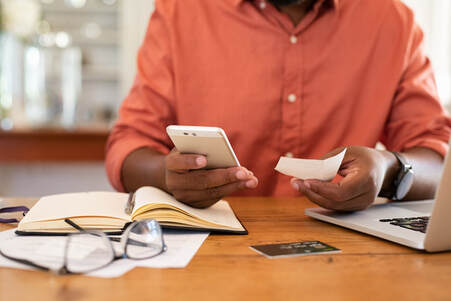 When it comes to paying your monthly bills—a chore that we all dread—you do have choices. There are three simple options. You can pay in person with cash or a check, use the tried-and-true method of mailing a check or pay your bills online using some form of electronic bill payment and presentment (EBPP). When deciding which option is best for you, it is important to understand the risks associated with each choice and the ways to reduce these risks. While all financial transactions involve some form of risk, it is generally assumed that paying your bills in person involves the least risk. Yet most people opt out of paying bills this way due to the amount of time and effort it takes to find the payment office and drive across town during business hours. That leaves you with two options—paying either by check or online. Online options have become more popular over the past several years but many people are still wary of the security risks associated with virtual payments and choose to pay by mail. However, research has shown that there is a higher risk of identity theft for those who mail checks. Identity thieves will use your account statement or the bills mailed to you to collect your information. Even worse, the check you mailed can be stolen and altered. This risk can be reduced if you make sure that your mail is secure when you send or receive it. Don’t ever leave outgoing mail with checks in an unsecure location.
Paying bills online also involves risks although many of these risks are preventable. The convenience of this option comes with security pitfalls that many customers make. Generally speaking, there are two ways to pay your bills online. You can pay through a web bill pay function that is included on an internet banking product provided by your bank. Alternately, you can log in to a biller’s website and pay using a credit or debit card. Regardless of which option you choose, below are six practical tips that will help protect your personal information while using online technology. 1. Do not use a public computer If you are using a computer that others also have access to, they can easily install a key (logger software) that can collect your user ID, PIN numbers or credit/debit card information. 2. Do not use a public Wi-Fi network All it takes is a moderately tech-savvy criminal and a low-cost scanner, and your information can be plucked out of thin air. By the way, a hotel Wi-Fi network is not a secure network. 3. Keep your browser up to date No matter what browser you are using, make sure you keep it updated. All browsers are regularly updated to address security and performance issues. If you haven’t or can’t update your browser, your security can be compromised easily. When those pesky boxes pop up telling you to update your browser, take the time to do it—especially if you are using online bill pay. Also, always look for a secure connection. You should see a secure padlock in the bottom right-hand corner of your browser that tells you your information is encrypted. Lastly, make sure that any page you use to pay bills online has a URL (address) with “https" in it as this signifies a secure connection. 4. Use anti-virus/anti-malware If you use your own personal computer to access the Internet, you need to have anti-virus and anti-malware software running and current. 5. Passwords, passwords, passwords! Don’t even think about using 1234 or abcd as your passwords. Take the personal responsibility to secure your information with a secure password! It is very important to change your password on a regular basis. A strong password should contain uppercase and lowercase alpha characters (but no words or names) and numeric characters, and be at least eight characters long. Use a special character as well if the site allows one. If you’re having problems managing your passwords, think about using password management tools like KeePass Password Safe. 6. Don’t click on links Either bookmark the website in your browser or type in the website address. Don’t click on a link provided by your bank or a biller in an email. These links can lead you to fake websites that attempt to capture your information when you log in using your ID and password. By not clicking on that link, you are protecting yourself against a phishing expedition. By following these six easy security tips, online bill payment is proven to be not only cost effective and convenient but also secure and highly reliable. This information is provided with the understanding that the association is not engaged in rendering specific legal, accounting, or other professional services. If specific expert assistance is required, the services of a competent, professional person should be sought. Provided as a public service by the Pennsylvania Association of Community Bankers. Comments are closed.
|
AuthorWrite something about yourself. No need to be fancy, just an overview. Archives
December 2017
Categories
All
|
|
Pennsylvania Association of Community Bankers
800 N. 3rd Street, Suite 304 Harrisburg, PA 17102 Phone: (717) 231-7447 [email protected] | sitemap (C) All Rights Reserved Our Privacy Policy Our Copyright Policy |
"To empower community banks to make positive impact within the communities they serve."
|
